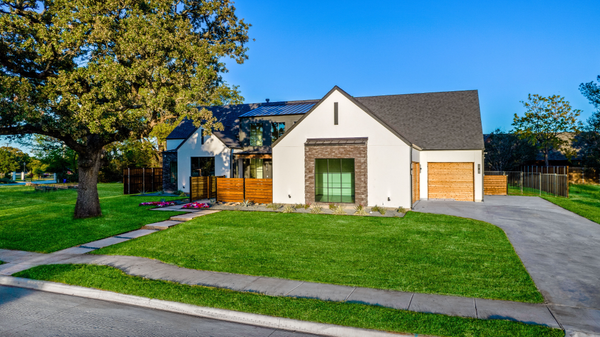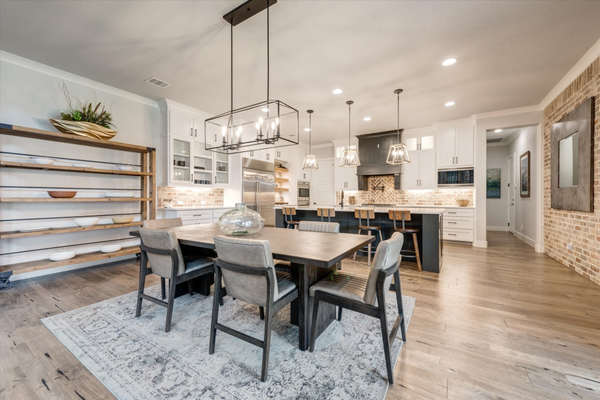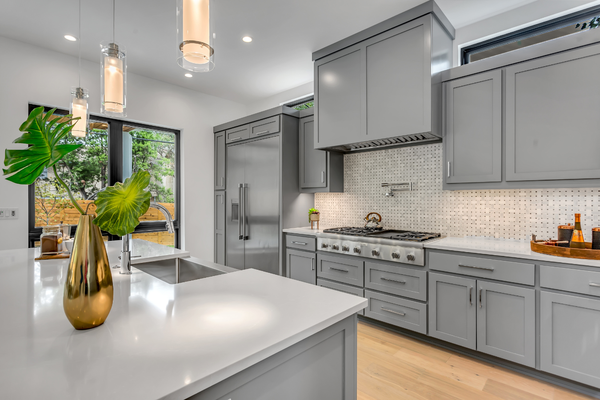
3 Things to Consider When Buying a House
Everyone has different priorities when it comes to buying a new house. The purchasing process is complicated and time-consuming, making it easy for you to go off track. Thus, it's a good idea to write down your priorities as they will serve as a guide through the purchasing process without making you overlook some of the features that are important to you and your loved ones. Your real estate agent would also like to learn about your list. Knowing which features matter the most will help them eliminate listings that aren't suitable for you and compare the ones that are. In this article, we will look at the three critical things you need to consider when purchasing a new home. 3 Things to Consider when Buying a House Buying a house is perhaps one of the biggest expenditures you will undertake in your life. Thus, it can be a little overwhelming and a bit terrifying too. Before moving ahead with your search for the perfect home, read through these three things you need to consider before buying a house. 1. Your Lifestyle Needs Unless you're constructing your own house, it is highly unlikely you will be able to achieve every dream on your home "wish list." You'll need to prioritize the features you absolutely need in your home versus the features you want. This varies for each homeowner. For instance, if you work from home, you will want a house with a home office. If you have a new baby on the way, you will need a house with extra space. Similarly, if you have children who don't like to share a room with their siblings, you will need a house that has a room for everyone. When you are thinking of your needs and wants, you need to pay attention to what other people would need and want in a house. If you are selling this house in the future, you should think about the resale price of any potential home. Nevertheless, make sure to take into account all the factors that can influence resale value. Sometimes, you might not pay attention to a particular factor because it doesn't impact you directly. For instance, if you don't have kids, you might not consider the school district in which a house is situated. However, certain families who might move into your house in the future will want to reside in school boundaries that are highly rated and ranked. 2. Location and Neighborhood The next thing you need to consider when buying a house is its location and neighborhood. You should find a location that allows easy access to the places you visit the most (school, work, recreation, shopping, homes of family and friends, places of worship, etc.) Look for quick and easy access to the main roads and assess the traffic flow. Considering this factor before buying can save you from the hassles of exiting the neighborhood and onto the main thoroughfare or from a long and troublesome commute. Look at the public transportation stops too. In fact, it's best for you to travel the routes yourself to determine what they're like, how busy they are, and how much time it will take for you to get from one point to another. Apart from the location, you should also consider the neighborhood in which the house is located. Remember, the house is part of a bigger community that you will exist in on a daily basis. Thus, it's imperative that you find a neighborhood that matches your needs before purchasing. Do you want to be able to walk to a coffee shop every morning, or would you prefer not to deal with possibly noisy neighbors? Whatever you want, make sure to do your research before beginning your search. If it's possible, go for a drive and spend some time in the neighborhood. Go out to have lunch at local restaurants and take a walk in a nearby park. After you identify areas that you like, inform your real estate agent, as they will use this information to show you listings you might like. 3. Affordability Getting pre-approval for a loan isn't an instant lock. However, it does give you a clear idea of what sort of mortgage you can manage, making this an important consideration. It's a good idea to make a 20 percent down payment on your home price so that you don't have to pay private mortgage insurance (PMI). Added to your mortgage payments, PMI can typically add $30 - $70 to your monthly mortgage payment for every $100,000 that you borrow. There might be certain reasons that you may not want to make a 20 percent down payment towards your purchase. Maybe you aren't planning to live in the house for a long while, have a long-term plan to convert the house into an investment property, or you don't want to risk making a large down payment. In that case, purchasing a house is still possible without a 20 percent down payment. For instance, you can purchase a house with a 3.5 percent down payment with an FHA loan; however, there are advantages to making a larger down payment. Along with avoiding PMI, a bigger down payment even means lower mortgage payments and more choices amongst lenders. It is important that you stay within your means, regardless of how much you like a house. Last Few Words Everyone deserves their dream house. With the right amount of research, it's very much possible! Use the factors mentioned above as points of consideration as you and your loved ones start the home purchasing process. They will allow you to focus on the qualities a house must have to be your ideal fit. At The Wall Team, we can help you search for homes that are in line with your needs and wants. Rest assured; our team will assist you from beginning to end!

Selling a House in Texas
Common Questions About Selling a House in Texas How much does it cost to sell a house in Texas? The cost for you to sell a house in Texas varies. It all depends! However, you could expect selling fees to account for 11.9 per cent or more of the final sale price of your house. Should you sell your house for $252,422, which is the average home value in Texas, you would likely lose $30,109. Clever.com. When is the ideal moment to sell a Texas home? It's crucial to know when to sell your Texas home. Everyone has an ideal moment based on their own experiences. Remember that the property market is always altering and changing. Not all strategies work now. It's vital to gather data to position yourself for a quick sell. June is reportedly the best month to sell a home in Texas. Selling your property in June typically nets you 5% more than the average sale price, according to Clever.com. May and June are the best months for selling quickly, with a median number of days on the market (31) which is 12 days less than the yearly average. Do you need a lawyer to sell a property in Texas? Texas does not require sellers to hire an attorney to sell their homes. Although not required, you may choose to hire an attorney at some point, particularly if you run into legal concerns or disagreements with buyers. Alternatively, you may need an attorney's help drafting a lease agreement if you want to rent the home for a long time after the closing or if title issues arise, such as a lien against your property. When selling your house without the help of a real estate agent (FSBO), you may want to hire an attorney to help you with the legal paperwork. [Source: Lawyers.com] Selling a Home in Texas With and Without a Realtor 1. Selling Your Home with a Realtor For the most part, Texans contemplate selling their homes through a real estate agent to optimize their return. To avoid confusion, seller's real estate agents in Texas are also known as listing agents. A real estate agent not only lists and markets your house, but also helps you with showings, staging, contract negotiations, and closing. Listing agents will provide you with comparable market studies (comps), price recommendations, and marketing strategies tailored to your specific needs. 2. Selling Without a Realtor If you do your research and put in the effort, selling your property as a do-it-yourselfer or for sale by an owner in Texas may be rewarding. With a 6% commission on a $250,000 house, you may save $15,000! Owner-occupied houses also sell faster, sometimes in two weeks, according to the National Association of Realtors' Profile of Home Buyers and Sellers. The procedure isn't easy, so think twice before taking the plunge and selling your property on your own. Aside from promoting, staging, and negotiating the sale, you'll be responsible for all financial and legal documentation, which you should engage an attorney to handle. [Source: The Mortgage Reports] Lets Talk MLS Sell for a Flat Fee on MLS Sell my house Colleyville using "Multiple Listing Service" The MLS is a nationwide network of nearly 900 MLS. Because each MLS is autonomous, an Austin real estate agent cannot view San Diego listings. As a result, you must be listed in the right MLS. Why pay a fixed cost for an MLS listing? The MLS represents the whole "real estate market." Over 90% of all sold properties in the US are due to MLS listing exposure All local Realtors, agents, and brokers may find and market your property on the MLS Buyers can find your home on hundreds to thousands of public MLS websites. MLS-listed houses sell faster and for more money. In Texas, you may avoid expensive real estate commissions (on average, 6 percent). You can sell your home on your own. You own your listing. Qualified buyers will contact you personally. You set the contract offer terms and conditions. The MLS allows you to cancel your listing at any time. Other Things to Think About Texas Purchase Contract A Texas residential buy and sale contract outlines the details of a real estate purchase offer. The document informs the seller of the buyer's price range and the various conditions precedent to the sale. How does Texas escrow work? The Texas Department of Insurance requires escrow processes to protect consumers' funds during real estate transactions. The valuation of the property and the escrow company decide the escrow expenses in Texas. These fees are paid to the title and escrow company. Texas escrow normally takes 30–45 days. The buyer and seller agree on the escrow period, which is then settled when the deal is completed. [Source: Endpoint] Negotiating Selling your house is likely to be one of the largest financial transactions you'll ever make, and the price you agree on with a buyer, as well as the real estate commissions you pay, will decide how much money you walk away with. Counter Your List Price If a potential buyer makes an initial offer that is lower than your asking price, respond by adhering to your specified buying price. Countering at your list price indicates that you understand the value of your property and aim to obtain it for the amount you deserve. When you want to be harsh but are scared about looking too rigid, use this method. Refuse the Offer If you're looking for a buyer, decline their offer and request that they submit a new one. This indicates that you believe your property is worth the price you're asking for it. If the buyer resubmits, they must make a greater offer unless they play hardball in response. Start a Bidding War After listing the home, plan an open house for a few days. Refrain from accepting any bids until after the open house. If you receive numerous bids, go back to the top bidders and request their highest and best bids. It provides you with a psychological advantage when dealing with counteroffers, etc. Include a Closing Date in Your Counter Offer Consider placing an expiration date on your counteroffers if you're seeking to sell your house quickly. Disclosure might lead to greater offers, but it can also scare off potential buyers. The longer your house is on the market, the less appealing it seems. Acceptance of Closing Costs Closing expenses might be as much as 3% of the purchase price. Buyers are frequently cash-strapped as a result of the down payment, moving expenditures, and remodeling charges. Some purchasers cannot afford to consummate the sale unless they receive assistance with closing expenses. [Source: Investopdia] Closing or selling in Texas The closing is when the buyer takes possession of your home. This can happen anywhere both parties agree. When the lender informs the Texas closing attorney that everything is ready, the closing attorney will prepare the "closing ceremony" with all parties and their representatives. Following the closing, the lender often provides the buyer with a "closing disclosure" that outlines the loan terms and conditions, as well as the funds required to close. Consider the Wall Team to sell your house in Texas.

Tips for Buying a Home in Texas
Buying a home can be an exciting event. There are many factors to consider, and the process can become more complex than many people realize. The following tips and resources should help you through the sometimes frustrating process of buying a home in Texas. In this article, we'll discuss why you should buy a house in Texas, the requirements, and tips on buying a home in Texas. Why You Should Buy a House in Texas A home is a great investment, and no place in the US has as much opportunity for that investment as Texas. Here are a few things to consider before purchasing a home in the Lone Star State. No Property Tax Ever since Texas declared independence from Mexico, residents have not had to pay any property tax on their homes. This keeps down the price of homes considerably, so when you decide to sell your house, you'll get much more than if you'd bought somewhere else. Lots of Real Estate Options In Texas, you have many options—especially when it comes to size! Some homes and apartments range from "cozy" up to "Texas big," so whatever your needs are, there's something out there for you. A Solid Return on Investment If you're worried about buying a home and hoping it goes up in value over time, don't be! Texas real estate generally appreciates at a rate of 10% per year, higher than anywhere else in the country. Vibrant City Life Colleyville is a great city to live in only 40 minutes from the hustle and bustle of Dallas. If you're looking for a charming city that is close to city life, you'll find it in Texas. Outstanding Food Culture Whether you want BBQ or Tex-Mex or just something different, you can find it in Texas. You'll find that food is truly king here, from the rich Gulf Coast seafood to the spicy Hill Country sausage. A Solid Return on Investment You can get more bang for your buck here than anywhere else in the country, and prices have been on the rise each year over the past decade. Strong Housing Market Residents enjoy an excellent quality of life in Colleyville, with 98% saying they're happy with it. The employment rate is also very high in Dallas—over 80%, above both the state and national averages. Requirements for Buying a House in Texas If you're thinking about buying a home in Texas, you must meet several basic requirements before you can secure the property. Your credit must be above average. Most lenders recommend a minimum score of 680, and anything below that should be considered carefully. You must have a low debt to income ratio—that means you won't qualify for a mortgage if your credit card payments and other debts take up more than 40% of your income. You'll need financial documentation such as tax returns, bank statements, and W-2s to show proof of income. An appraisal will be required to confirm the value of the property is accurately reflected in the sale price you are paying for it. You'll need to put down at least 20% of the cost of the home upfront; most banks will require at least 10%. Tips for Finding the Right Home Buying a home can be a daunting process, but luckily for you, we've compiled some tips to help make the process smoother. If you're about to buy a home, here are tips for finding the right one for you. Think About What You Need Before finding homes, make a list of things that are important to you. Be sure to write down everything important to you so that your real estate agent can help point out potential homes that fit your needs. Don't forget about things like proximity to your job or the quality of schools in the area. After all, a great house is no good if it's far away from where you work! Use A Good Realtor Your real estate agent is there to ensure that the whole process goes smoothly. Your agent can help make sure that everything goes as planned, from making sure that you understand what paperwork is required for the purchase to making sure that any issues with the home are resolved before closing. However, you need to work with a reliable, trusted, and caring agent like Wall team agents. The agents know all corners of Colleyville, Texas, and the surrounding area. They'll help you find what you exactly need. Budget Before you start looking at homes and visiting real estate agents, decide what price range is comfortable for you and stick with it. It's easy to spend more than you intended if you don't know what your limits are. Get Your Finances Together Whether you're moving in with someone else or moving out on your own, you should first make sure that you have a handle on your finances. You probably want to wait until you're settled in before jumping into any big purchases with your new roommate or buying all new kitchen appliances for your new place. Set a Moving Timeline Finding a place will take some time—and so will moving! Make sure that you give yourself plenty of time to find an apartment or house that's right for you, and then set up a schedule for when things will happen. For example: "This week I'm searching for apartments online; next week I'll visit three apartments; the following week I'll sign my lease." Also, don't forget about the moving timeline! You may want to hire movers for this part of things. Consider the Size The right size of your home is dependent on how many people are going to live there. If you have a large family, you may need a larger house so that everyone has enough space. However, if you live alone or with one other person who doesn't mind living in close quarters, you can get away with a smaller house. Wrapping Up Buying a home for the first time is exciting and scary all at the same time. You are starting a huge step by making such a big purchase. After all, you will have this home for years to come. You need to keep in mind many things when searching for a new home. This article covers what you should know when buying a home in Texas.
Categories
Recent Posts









